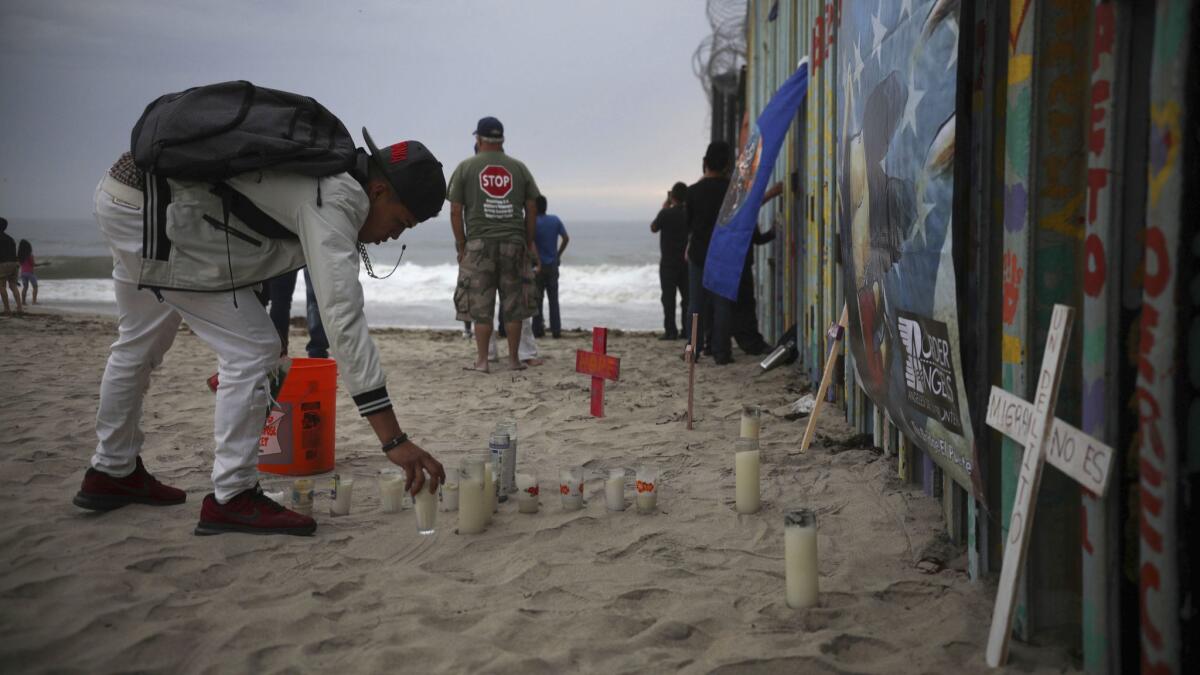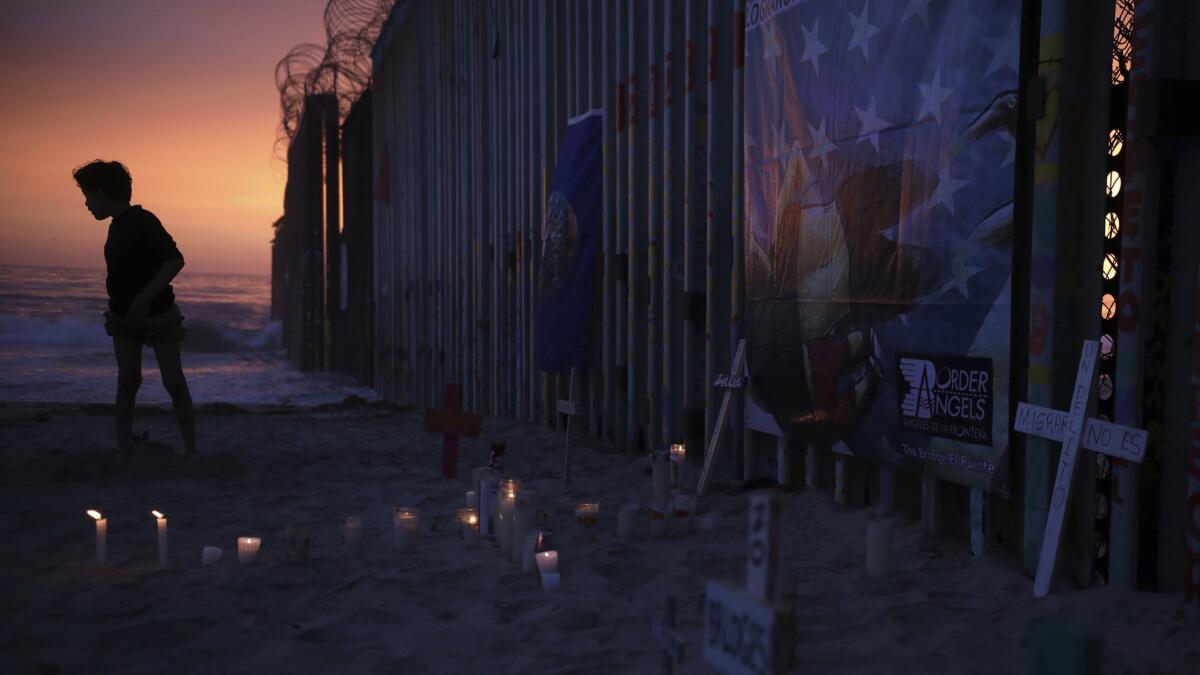Migrants contemplate dangerous crossings despite border deaths and detention conditions

Reporting from Matamoros, Mexico — Some migrant families this weekend contemplated crossing the swirling Rio Grande from Mexico to seek asylum in the U.S. despite several recent drowning deaths.
Cuban migrant Viviana Martinez was considering the dangerous crossing with her husband and 1-year-old son. She’s five months pregnant and has been in the northeast border city of Matamoros waiting to cross the border legally into Texas for more than two weeks.
Martinez, 30, worried about her family’s health and safety. There were 160 other asylum seekers on the waiting list to cross the border, and only a handful had been allowed across since she arrived. Some families had waited two months.
“We’re so desperate here, I think about going to the river,” Martinez said Saturday.

Migrant advocates, meanwhile, held vigils Sunday for six migrants who died attempting to cross the river last week, including a Salvadoran father and his toddler daughter found in Matamoros. Congressional lawmakers and Democratic presidential hopefuls also visited the border to demand the Trump administration stop blocking asylum seekers from entering the U.S. and address squalid conditions in migrant holding areas.
A dozen children have died crossing the U.S.-Mexico border this year, more than in any year since at least 2014, according to the International Organization for Migration. The deaths came amid a surge in migration at the southern U.S. border — nearly 600,000 migrants since October, including 144,000 last month, a 13-year monthly high that has led to crowding at border holding areas and shelters.
In Matamoros, Mexican authorities maintain a controversial list of asylum seekers that has stretched to more than 2,500. More than 100 were waiting at the border bridge to Brownsville, Texas, on Sunday, some of whom had met Oscar Martinez Ramirez, the 25-year-old Salvadoran father who drowned with his daughter Valeria a week ago (his wife survived and has returned to El Salvador). A photo of their bodies in the river sparked international outrage, and news of their deaths scared some migrants from trying to cross the Rio Grande.
Venezuelan migrant Nivea Arias said she and her family pleaded with Martinez not to go, but he said he couldn’t wait to cross the bridge legally and entered a trail to the river instead.
“It’s hard to wait here, but risking your life? No,” said Arias, 53, who has waited at the bridge since last Wednesday with her adult son, daughter and 4-year-old granddaughter.
She said the migrants’ deaths “were like a message: Don’t go by the river.”
Late Sunday, Mexican officials allowed Viviana Martinez and her family to cross the border and claim asylum in the U.S., along with another family of three, which gave those waiting some hope.
“But every day, new people come” and join the list, said Mireyda Mendoza, 30, who was waiting with her husband and 11-year-old son.
On Sunday, former Texas Rep. Beto O’Rourke met with Central American asylum-seeking families at a migrant shelter in Juarez, across the border from his native El Paso, where they had been returned to wait out their immigration cases under Trump’s “Remain in Mexico” program. Under the program, migrants who seek asylum on the U.S. border are returned to Mexico as their cases are adjudicated, a process that can take months or even years.
Among those who spoke to O’Rourke was a 19-year-old Salvadoran woman who said U.S. officials at the border separated her from her parents and younger siblings, who were allowed to travel to Los Angeles while she was returned to Juarez to wait for several months while her U.S. immigration case proceeds. Another woman said she fled Honduras after attackers tried to kidnap her, traveled atop a train with her 10-year-old daughter to the border, was returned to Mexico four months ago and is awaiting her next U.S. immigration court hearing in September.
“We hope, by sharing these stories, that the conscience of our country is awoken right now, and the need to change the policies that we have in place,” O’Rourke said after speaking with the women in Spanish.
O’Rourke later held a rally outside a Border Patrol station in Clint, Texas, where advocates recently reported seeing hundreds of sick migrant children held without adequate adult supervision, food and toiletries.
On Saturday, Rep. Will Hurd (R-Texas), who represents the area, toured the Clint facility and told reporters that he saw no signs of migrants being mistreated but that children should not be housed in such spaces not designed for them.
Presidential hopeful Julián Castro, a former San Antonio mayor and Housing and Urban Development secretary, met with El Paso migrant advocates at a local shelter before stopping at the Clint facility, which his brother, Rep. Joaquin Castro (D-Texas), is scheduled to tour Monday with fellow members of the Congressional Hispanic Caucus.
“Children are living in terrible conditions, many of them crowded into the same room,” Julián Castro said as he stood outside the station.
In Texas’s Rio Grande Valley, advocates held two vigils late Sunday to mourn migrants who died attempting to cross the Rio Grande.
Terry Sprague of Hillsborough, Calif., attended the candlelight vigil in McAllen with about 100 other people after delivering donations to migrants with volunteers from Bay Area Border Relief. Sprague said she saw children released from Border Patrol custody shoeless and despondent.
“We’re mistreating them after they make this long journey,” she said as a line of several dozen migrant families passed the vigil on their way to a nearby bus station.
In addition to Oscar Martinez Ramirez and his daughter, the bodies of four Guatemalan migrants were found June 23 on the U.S. banks of the river near Mission, Texas.
Briseida Liseth Chicas PĂ©rez, 20, had crossed the river with her 1-year-old son Denilson and two other infants only to suffer dehydration and die. A local priest, Father Roy Snipes, was summoned to bless the four in their body bags before they were returned to Guatemala, and he later celebrated Mass in their honor. Afterward, two dozen worshipers dropped wreaths bearing the names of the Guatemalan migrants, Martinez and his daughter into the Rio Grande near where they died.
Candy Martinez, 49, lives nearby and said she was moved by the deaths of such small children, all younger than 3, and their parents.
“How desperate can they be that they went to this extreme?” she said.
At a shelter in nearby McAllen on Saturday, Nicaraguan Alma Lira and her 7-year-old son Jaime waited in line for food and toiletries with 250 other newly released migrants after crossing the river.
They had come to join Lira’s husband, who migrated last year and settled in Miami. Lira, 34, said she crossed the river last week with a smuggler and four other migrants even though none of them knew how to swim, but they improvised, paddling across safely, she said.
Only later did she learn of the six recent migrant deaths.
“We don’t think in the moment that we are doing the wrong thing,” Lira said as she prepared to take a bus to Miami on Sunday. “We think we are doing the best for them. We don’t think that could happen.”
More to Read
Sign up for Essential California
The most important California stories and recommendations in your inbox every morning.
You may occasionally receive promotional content from the Los Angeles Times.











